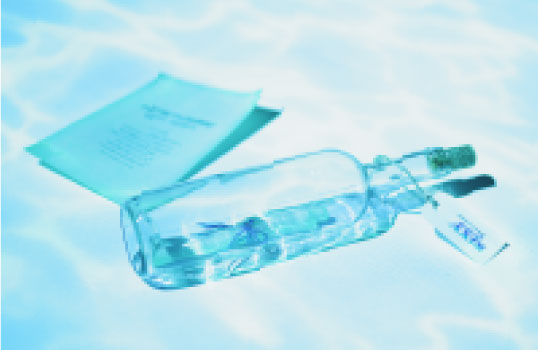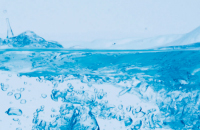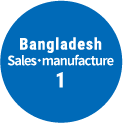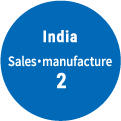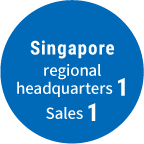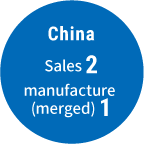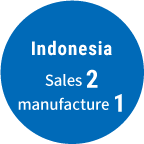- TOP
- INVESTOR RELATIONS
- Daiki Axis in numbers
Daiki Axis
in numbers
- [ Business performance history ]
Since the establishment in 2005, the Group continued to grow by taking full advantage of know-hows cultivated from having environment and water as the lynchpin (or the AXIS), as well as the synergy between multiple businesses within the Group. The Daiki Axis Group will continue to make efforts to improve the corporate value as a group that creates a nature and people friendly future.
■ Sales 100 million / unit
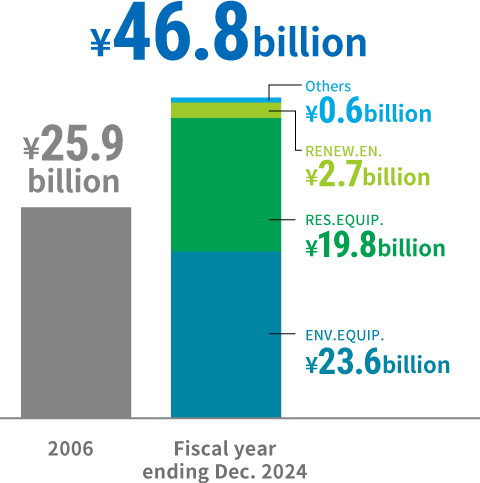
■ Operating income *After adjustment of connection
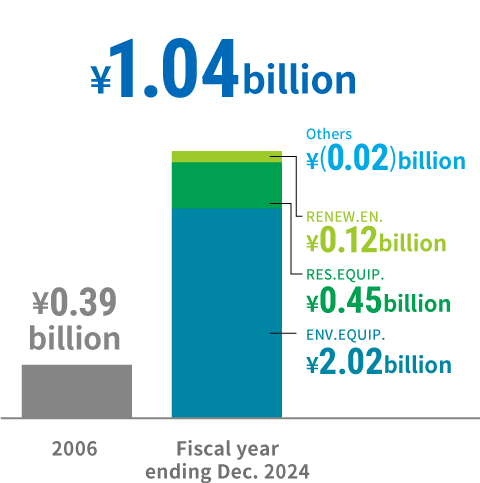
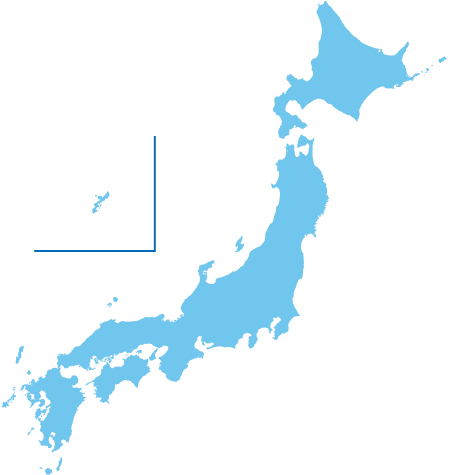
- [ Numbers of domestic bases ]
※ as of the end of Dec. 2024 -
40
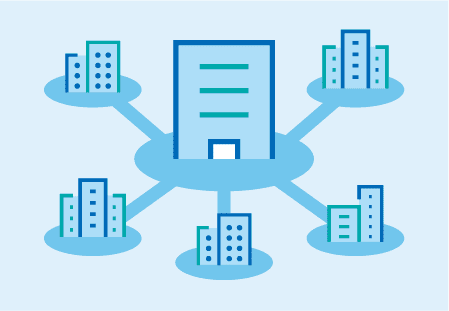
- [ Numbers of affiliated companies ]
※ as of the end of Dec. 2024 -
19
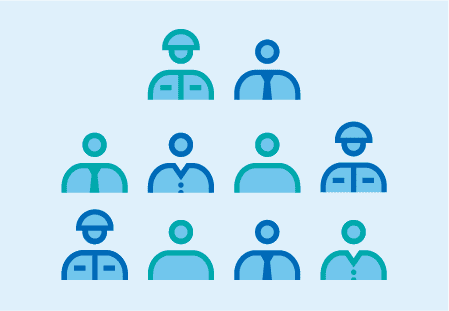
- [ Numbers of consolidated employees ]
※ as of the end of Dec. 2024 -
1,073
Overseas
- [ Number of bases per country ]
※ as of the end of Dec. 2024 -
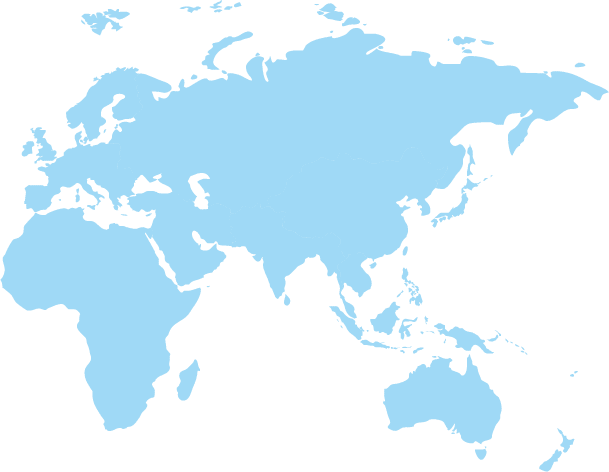
- [ Number of sales distributors ]
※ as of the end of Dec. 2024 -

32
Signing distributor contracts with local companies, the Group is aiming to expand the sales network of each country and to work together to root this business in the region, for an efficient expansion.
- [ Sales overseas ]
-
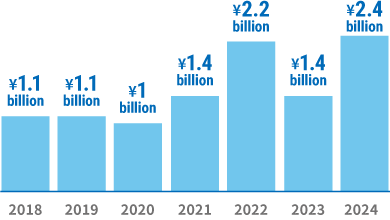
Since the listing in 2013, the Daiki Axis Group started expanding globally with the opportunity of M&A of a local company in Indonesia. From the base in Japan, the Group will continue to expand overseas mainly in Southeast Asia and South Asia.
Recurring revenue model business
The Daiki Axis Group’s business model includes signing a contract with customers for the maintenance of wastewater treatment equipment, etc., which allows the group to gain profit continuously, or keep recurring revenue, as long as the contract does not expire, therefore is strengthening a sustainable management foundation.
Maintenance business
As a highly profitable project, orders received in bulk is expanding for wastewater treatment equipment and johkasou maintenance for stores and factories that are run by giant companies that own national chains.
- [ Maintenance sales ]
※for fiscal year ending Dec. 2024 -

6.3billion
- [Number of maintenance contracts]
※ as of the end of Dec. 2024 -

4,410
Clean water business: ESCO method
The groundwater drinkable system achieves a stable supply of safe and affordable water 24/7.
In addition to addressing water quality needs, the pricing system that customers are to pay according to their use of water while Daiki Axis hold rights to the equipment, limits the customers’ burden on investments.
Furthermore, it will also contribute to the customers’ BCP and CSR as it can coordinate with the public water supply, allowing them to secure multiple lifelines in case of a disaster.
- [ ESCO sales ]
※for fiscal year ending Dec. 2024 -

¥0.6billion
- [ ESCO method installation cases ]
※ as of the end of Dec. 2024 -

116
Renewable energy related business
Solar power
By installing solar power equipment on the roof of a commercial facility, solar power is generated without the need of deforestation, contributing to the reduction of the environmental load by providing energy that is safe and clean.
- [ Volume of annually generated electricity ]
※for fiscal year ending Dec. 2024 -

52,123MWh
Equivalency to ordinary households’ annual electricity consumption: worth 9,476 households / year (annual electricity consumption estimated 5.5MWh)
- [ Numbers of facilities ]
※ as of the end of Dec. 2024 -

197
- [ Scale of electricity generation per facility ] ※ as of the end of Dec. 2024
-

31,627kW
- [ Environmental improvement(reduced CO2 volume)]
※for fiscal year ending Dec. 2024 -

21,966t-CO2
D・OiL (Bio-diesel fuel)
D・OiL is a refined bio-diesel fuel from waste cooking oil (e.g. oil used for deep frying) collected from homes, restaurants and stores that can be reused as an alternative to diesel fuel for energy recycling. It contributes to the reduction of CO2 on a global scale.
- [ Waste cooking oil collected ]
※for fiscal year ending Dec. 2024
-
608,952ℓ
※Equivalent to 1,217,904 of 500㎖ PET bottles
- [ Producible volume of BDF
from the collected cooking oil ]
※for fiscal year ending Dec. 2024 -
548,057ℓ

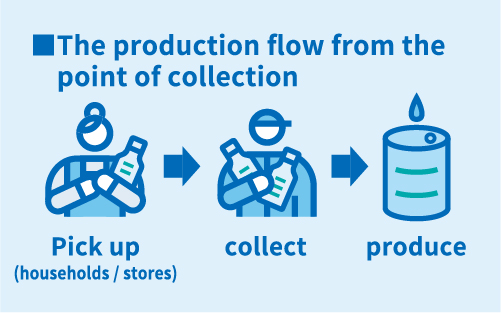
- [ D・OiL sales ]
※for fiscal year ending Dec. 2024 -

163,197ℓ
- [ B5 diesel-fuel sales ]
※for fiscal year ending Dec. 2024 -

1,449,362ℓ

- [ Environmental improvement (reduced CO2 volume)]
-

612t-CO2
- [ Possible driving distance with the D・OiL・B5 diesel oil sales ]
-

161,256km-approximately


